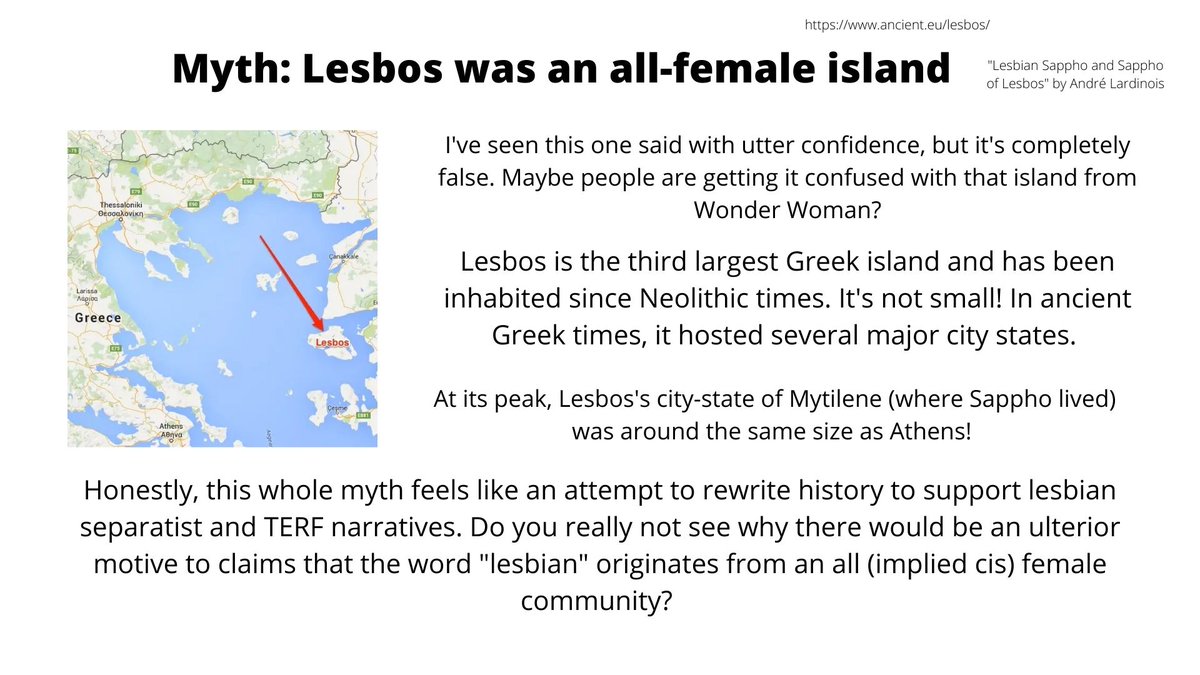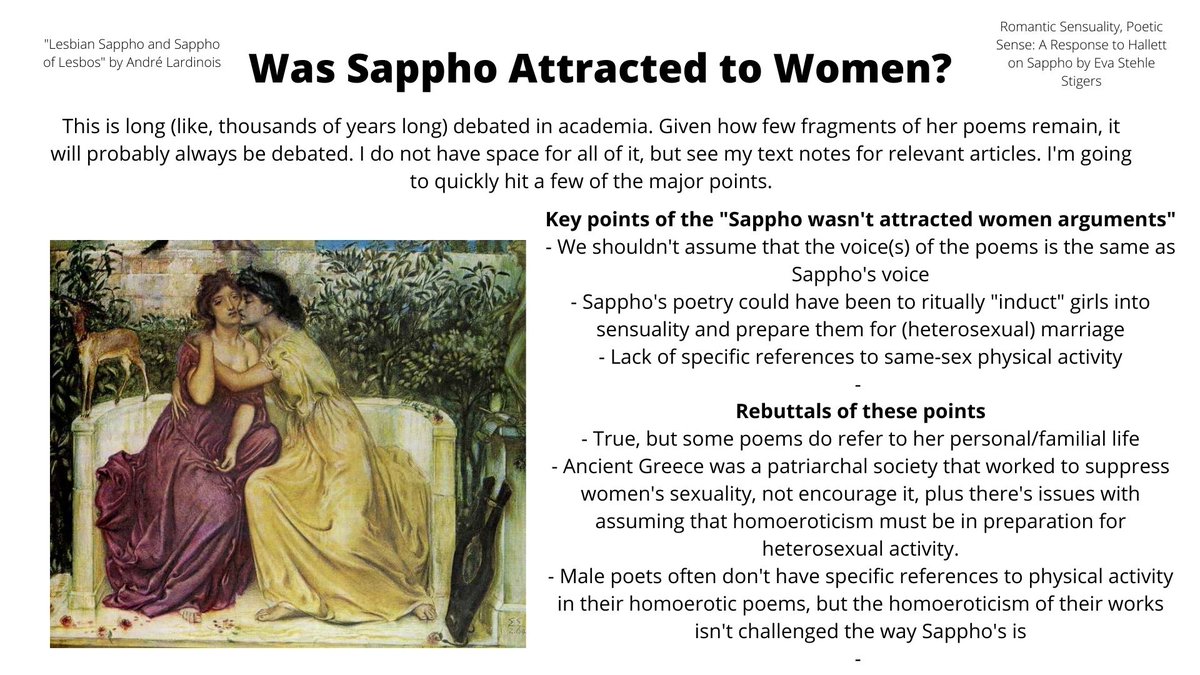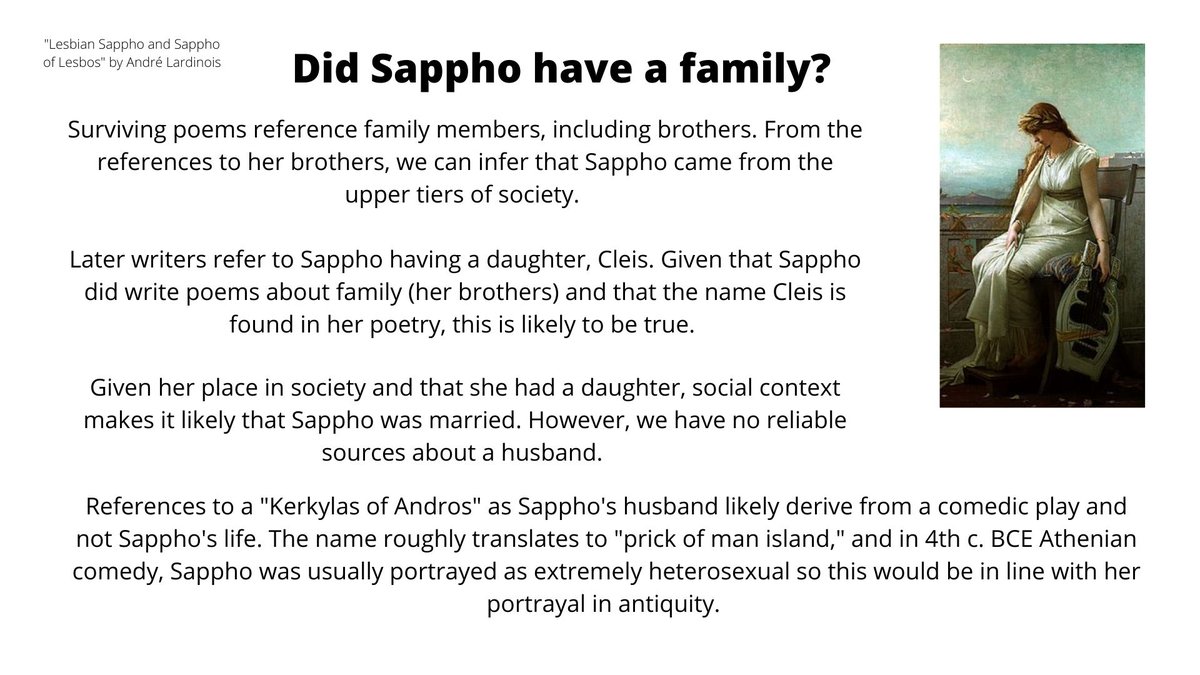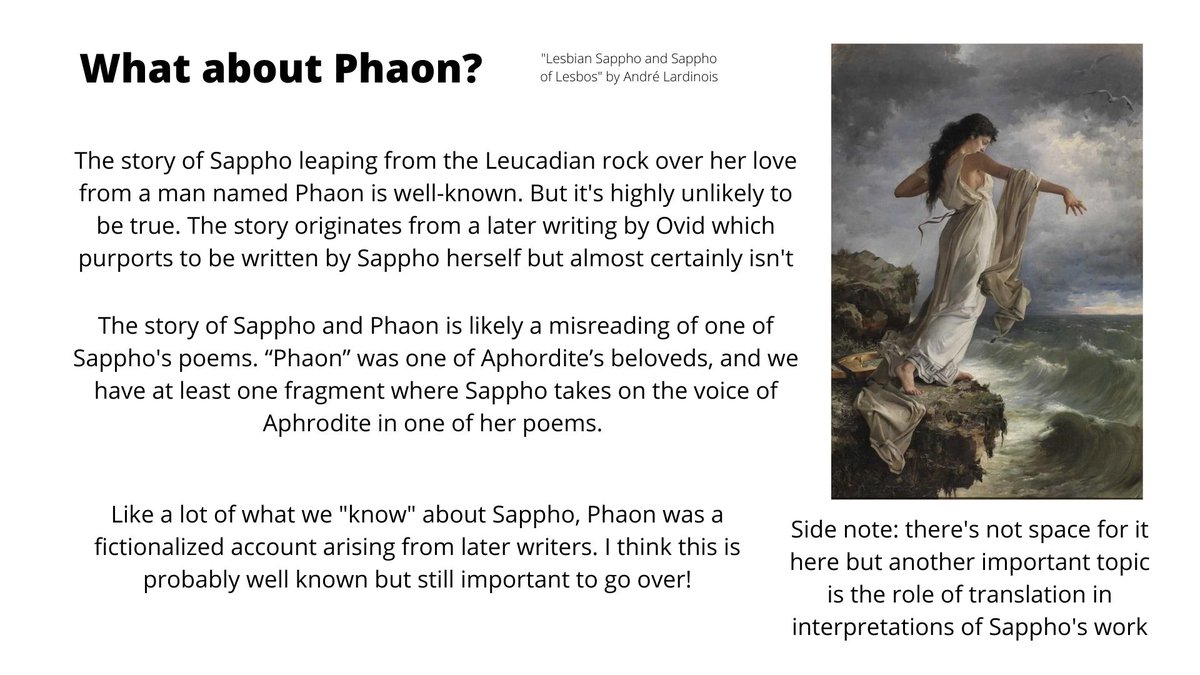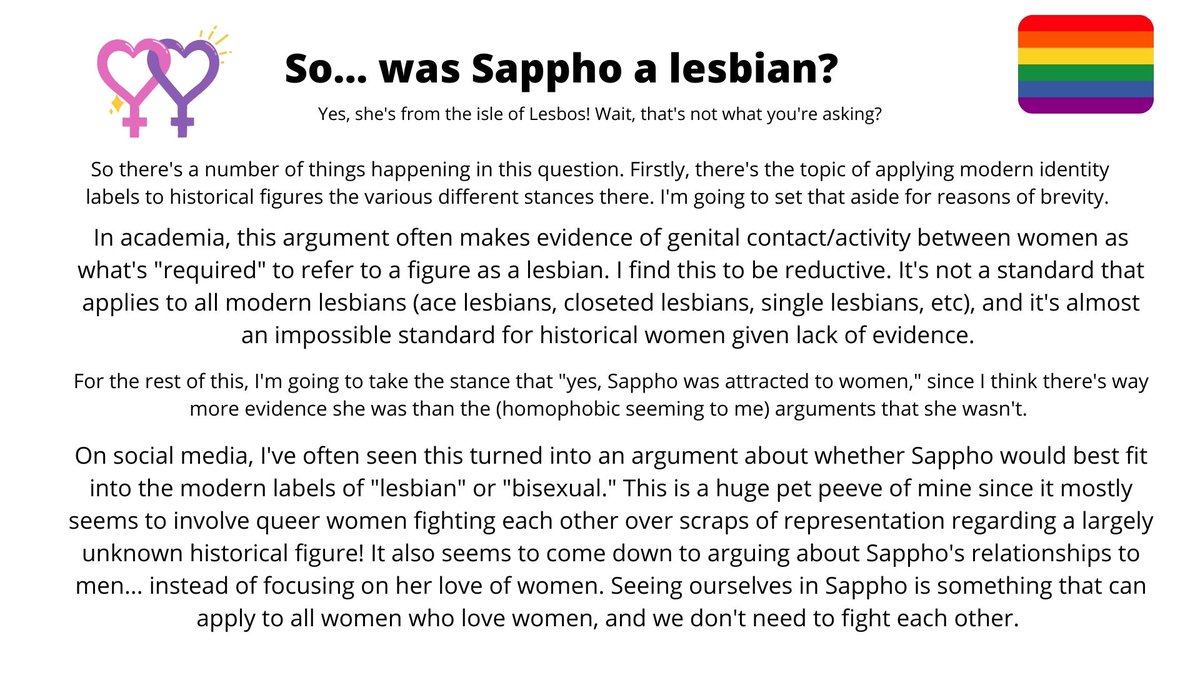Don& #39;t ask me why I& #39;m awake, but I& #39;ve finally finished that post on Sappho!
There& #39;s a transcript of the entire thing and various sources over on Tumblr: https://coolcurrybooks.tumblr.com/post/627399978577461248/rules-for-engagement-with-this-post-if-you-dont">https://coolcurrybooks.tumblr.com/post/6273...
There& #39;s a transcript of the entire thing and various sources over on Tumblr: https://coolcurrybooks.tumblr.com/post/627399978577461248/rules-for-engagement-with-this-post-if-you-dont">https://coolcurrybooks.tumblr.com/post/6273...
I can& #39;t stress enough how little we actually know about Sappho as a person. She lived thousands of years ago, and very little of her work survives.
The reason I made this presentation, was I saw people claiming (and others then believing them) that Lesbos was an all-female island.
Like, what??? I since found out that several people had been told this by Classics teachers, but this idea is a complete fabrication!
Like, what??? I since found out that several people had been told this by Classics teachers, but this idea is a complete fabrication!
I didn& #39;t mention it here, but there are several prominent MALE classical figures who also came from Lesbos.
Admittedly, before doing the research I myself wasn& #39;t aware of just how large Lesbos was. But the "all-female" idea tends to treat it like it& #39;s a small island, not a very large island that hosted several major city-states!
I don& #39;t discuss the specifics of these poems in the presentation, but they tended to turn up in academic sources discussing Sappho& #39;s sexuality.
Another thing that didn& #39;t make it into the presentation is that there& #39;s a poetry fragment with an ambiguous reference to something that could be a dildo, but we don& #39;t have the context to say for sure.
"We don& #39;t have the context to say for sure" turns up A LOT in any discussion on Sappho.
OHHH BOY. Thousands of discussion of Sappho comes into play here.
I can& #39;t even hope to go over all of it, so I tried to provide some key points of various arguments.
For the record, I support a reading that& #39;s "yes, she was attracted to women"
I can& #39;t even hope to go over all of it, so I tried to provide some key points of various arguments.
For the record, I support a reading that& #39;s "yes, she was attracted to women"
A lot of the arguments that "oh no, Sappho couldn& #39;t have been attracted to women" seem to be rooted in some homophobic ideas.
I wanted to address the idea of Sappho as a school teacher because I& #39;ve had classics professors say it was a myth invented in the Victorian period, but I& #39;ve seen other people say their teachers treated it as a fact.
I don& #39;t get into it here, but one of the arguments that she was some sort of teacher figure (but not the professional role of "teacher" as we would think of it) revolve around the idea of her teaching her songs/poems to a choir.
(CN: references to pedophilia and CSA, specifically ancient Greek pederasty)
That Sappho& #39;s relationships paralleled the male structures of pederasty is treated as a given by most sources I& #39;ve read.
Holt N. Parker’s “Sappho Schoolmistress” is unusual in challenging it.
That Sappho& #39;s relationships paralleled the male structures of pederasty is treated as a given by most sources I& #39;ve read.
Holt N. Parker’s “Sappho Schoolmistress” is unusual in challenging it.
I don& #39;t want to go too much into the academic sources here, but I thought this was important to note in a discussion of Sappho.
Some of Sappho& #39;s fragments refer to family members. From them, we can infer that she was high placed in society (one poem has her brother doing something only high placed men were allowed to socially).
Later writers reference a daughter and given that the name is included in Sappho& #39;s poetry, her daughter probably did exist.
Given her high station and presumed respectable place in society, it& #39;s probable based on social context that she would have been married.
Given her high station and presumed respectable place in society, it& #39;s probable based on social context that she would have been married.
But we don& #39;t have any surviving (credible) information about a husband. The "Kerkylas of Andros" is a pun likely stemming from a comedic play.
I don& #39;t get into it, but the ancient Greeks stereotyped Sappho as aggressively chasing after men.
I don& #39;t get into it, but the ancient Greeks stereotyped Sappho as aggressively chasing after men.
One of the sources I worked from suggested that this was because there wasn& #39;t a divide between homosexuality and heterosexuality in ancient Greece -- it was all just sexuality, so homoeroticism in Sappho& #39;s lyrics was treated as general evidence of erotic desire.
Honestly, there& #39;s not much to say about Phaon. I figured I needed to include it, and I suppose you could get more into tracing how the story began and how its impacted cultural perceptions of Sappho.
I& #39;m frustrated with the "was Sappho a lesbian" question in general since it tends to involve the asker& #39;s specific notions of what the boundaries are on lesbianism.
For instance, the insistence that lesbianism must include sexual activity. I& #39;m both asexual and lesbian!
For instance, the insistence that lesbianism must include sexual activity. I& #39;m both asexual and lesbian!
In social media discourse, this tends to devolve into fights about whether Sappho was "really" lesbian or bisexual.
Note, the two communities split fairly recently which adds a whole other layer to this question.
Note, the two communities split fairly recently which adds a whole other layer to this question.
I don& #39;t like fighting about whether Sappho would fall into modern notions of "bisexual" or "lesbian." I think it& #39;s divisive and isn& #39;t something you can actually prove with historical evidence.
I think there& #39;s room for all women-who-love-women to see themselves in Sappho.
I think there& #39;s room for all women-who-love-women to see themselves in Sappho.
I want to thank @heatherosejones for providing me with sources! I didn& #39;t even scratch the surface of everything there is to know about Sappho, but I link to some more articles suggested by Heather in the text transcript. https://coolcurrybooks.tumblr.com/post/627399978577461248/rules-for-engagement-with-this-post-if-you-dont">https://coolcurrybooks.tumblr.com/post/6273...
I had four main sources for this.
Hallett, Judith. 1979. “Sappho and Her Social Context: Sense and Sensuality. in Signs 4: 447-464.
This one I mostly used for the argument that Sappho wasn& #39;t lesbian. I think there& #39;s a lot of problems with it which are addressed in...
Hallett, Judith. 1979. “Sappho and Her Social Context: Sense and Sensuality. in Signs 4: 447-464.
This one I mostly used for the argument that Sappho wasn& #39;t lesbian. I think there& #39;s a lot of problems with it which are addressed in...
Stigers, Eva Stehle. 1979. “Romantic Sensuality, Poetic Sense: A Response to Hallett on Sappho” in Signs vol 4, no 3: 465-471.
I don& #39;t know if I would agree with everything in this source (I feel like it becomes gender essentialist at times) but it provides some good material.
I don& #39;t know if I would agree with everything in this source (I feel like it becomes gender essentialist at times) but it provides some good material.
Lardinois, André. “Lesbian Sappho and Sappho of Lesbos” in Bremmer, Jan. 1989. From Sappho to de Sade: Moments in the History of Sexuality. London: Routledge. ISBN 0-415-02089-1
I used this for most of the "general" information on Sappho.
I used this for most of the "general" information on Sappho.
Parker, Holt. “Sappho Schoolmistress” in Transactions of the American Philological Association 123 (1993): 309-351
This was very useful! It goes a lot into how interpretations of Sappho are impacted by the interpreter& #39;s social context surrounding homosexuality.
This was very useful! It goes a lot into how interpretations of Sappho are impacted by the interpreter& #39;s social context surrounding homosexuality.

 Read on Twitter
Read on Twitter

